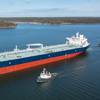The Lake Carriers’ Association (LCA) announced that the 2016 shipping season on the Great Lakes began on March 2 when the tug/barge unit Dorothy Ann/Pathfinder loaded 4,600 tons of iron ore at Cleveland Bulk Terminal for delivery to ArcelorMittal Cleveland at the end of the navigable portion of the Cuyahoga River. That much iron ore will keep the mill in operation for about one day. The vessel could have delivered another 4,100 tons, but the Cuyahoga River is notorious for silting up over the winter, and the U.S. Army Corps of Engineers will not dredge the river again until mid-May.
The next vessel to get underway will be the cement carrier G. L. Ostander/Integrity on March 7, LCA said. The tug/barge unit will depart Milwaukee and sail to Chicago, where it will load 3,300 tons of slag for delivery to Alpena, Mich. There it will then load 14,000 tons of cement for delivery to Detroit, Toledo and Cleveland.
The iron ore trade out of Escanaba, Mich., is expected to resume on March 16 when the Joseph L. Block loads 34,000 tons for delivery to Indiana Harbor.
The locks at Sault Ste. Marie, Mich., will open on March 25 and iron ore, low-sulfur coal and grain will again begin flowing from Lake Superior ports.
For the first time in a number of years the movement of dry-bulk cargo on Lake Michigan did not stop this winter. Two cement carriers, the Bradshaw McKee/St. Marys Conquest and Prentiss Brown/St. Marys Challenger, continued to move product from Charlevoix, Michigan, to Chicago, Milwaukee and Grand Haven, Mich.
In 2015, U.S.-flag Great Lakes freighters (lakers) moved 87.2 million tons of cargo, a decrease of 3 percent compared to 2014. The iron ore trade was down more than 10 percent because of record levels of foreign steel being dumped into the U.S. market, but legislation recently signed by President Obama, the Trade Facilitation and Trade Enforcement Act of 2015, promises to reign in tariff evasion and other unfair trade practices. In total it takes more than two tons of iron ore, fluxstone and other Lakes-delivered raw materials to make a ton of steel, so restoration of fair trade in steel is key to the future of Lakes shipping.














